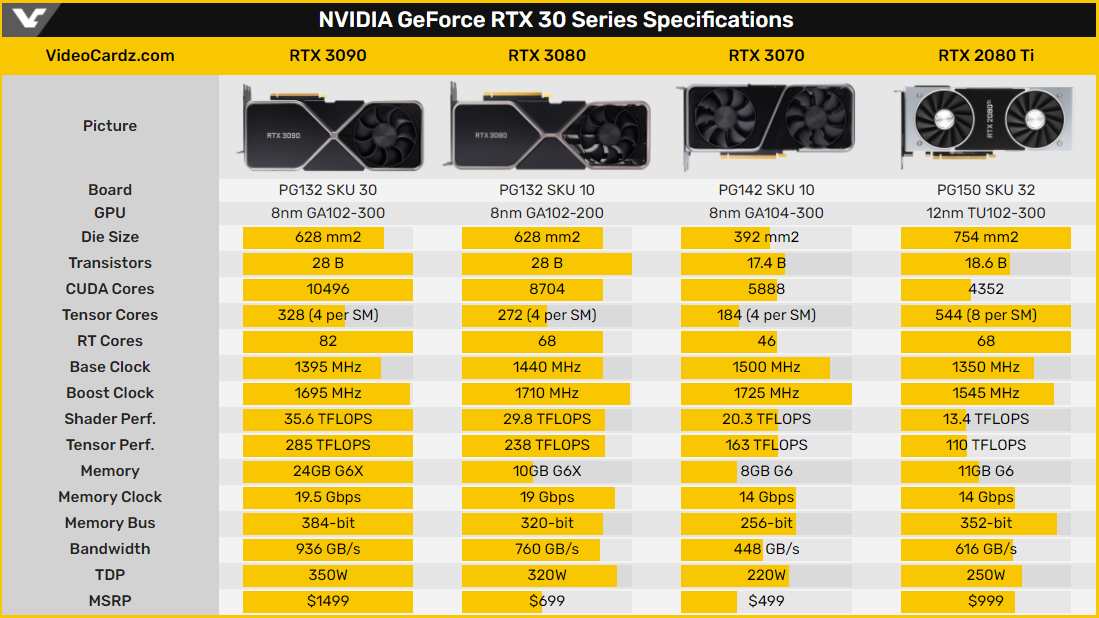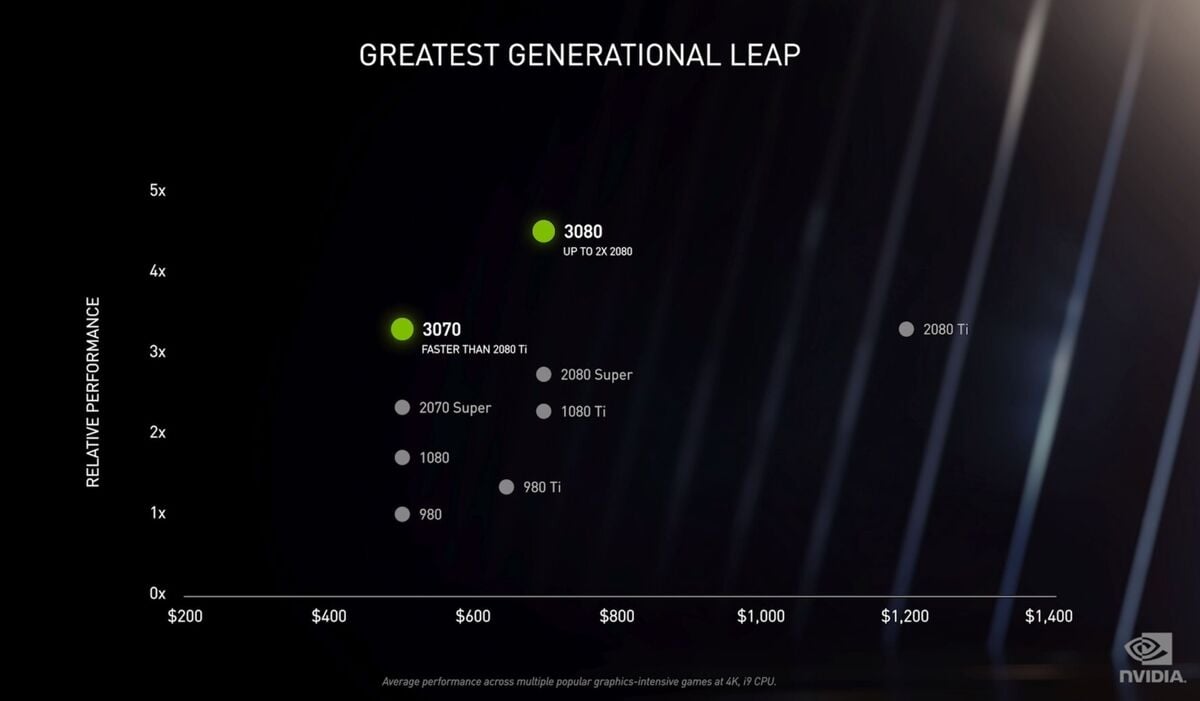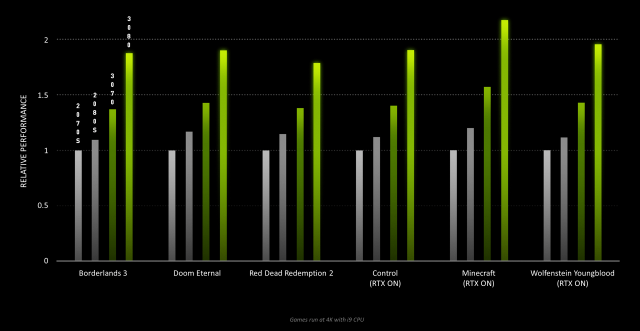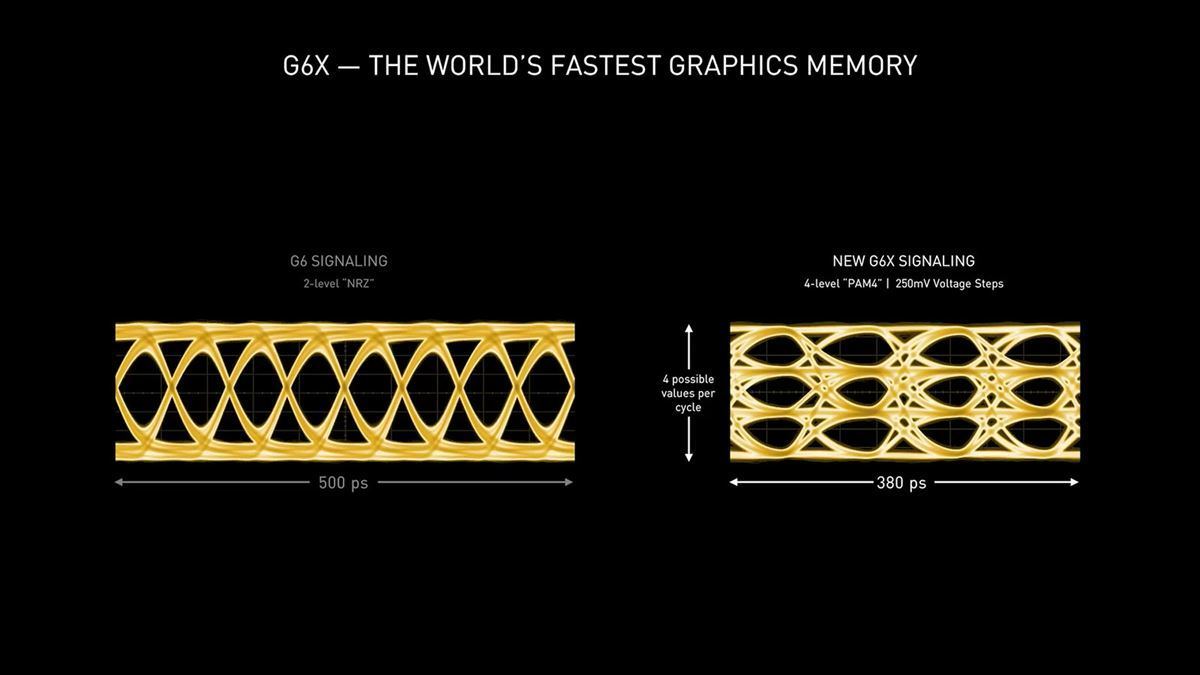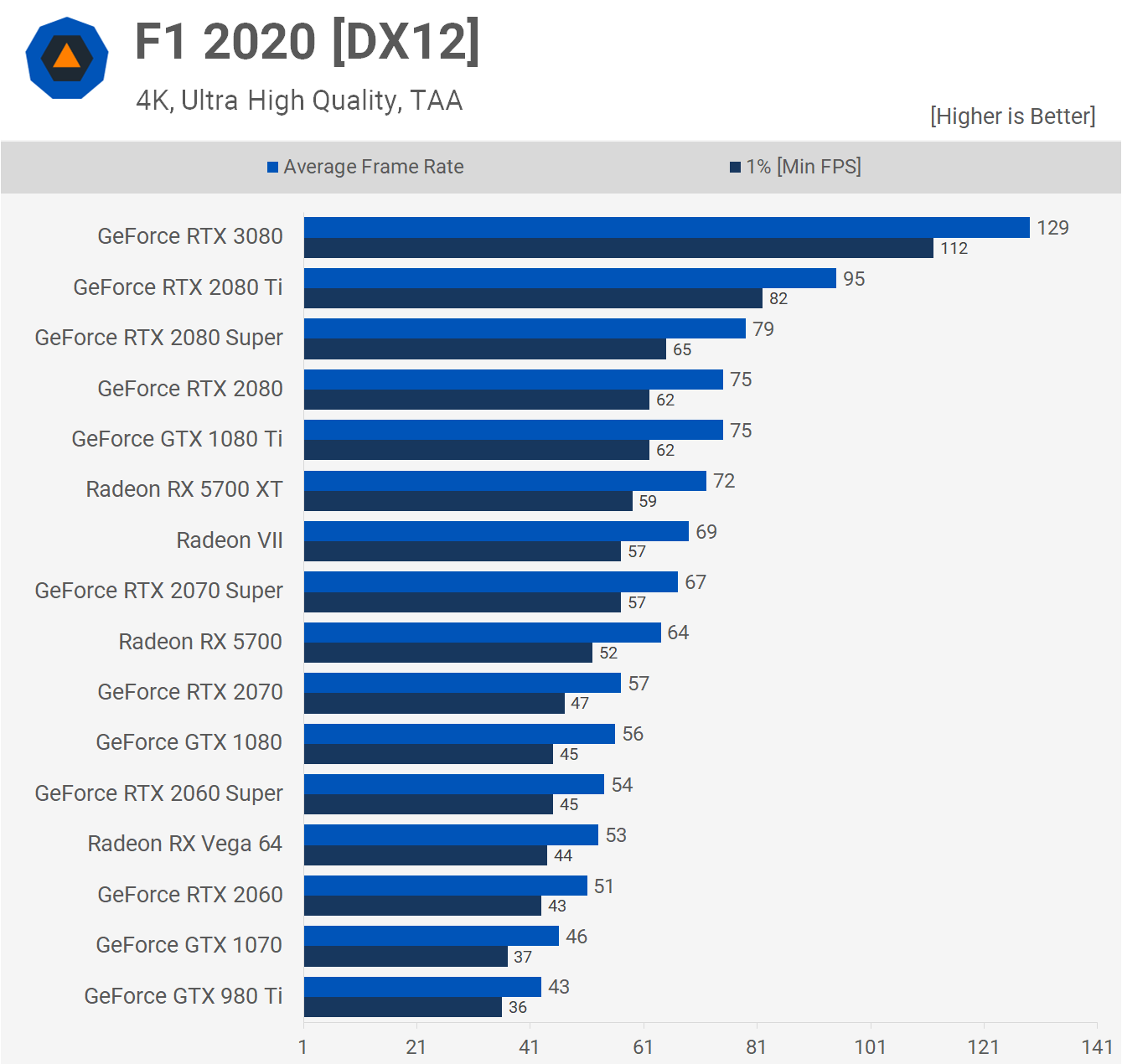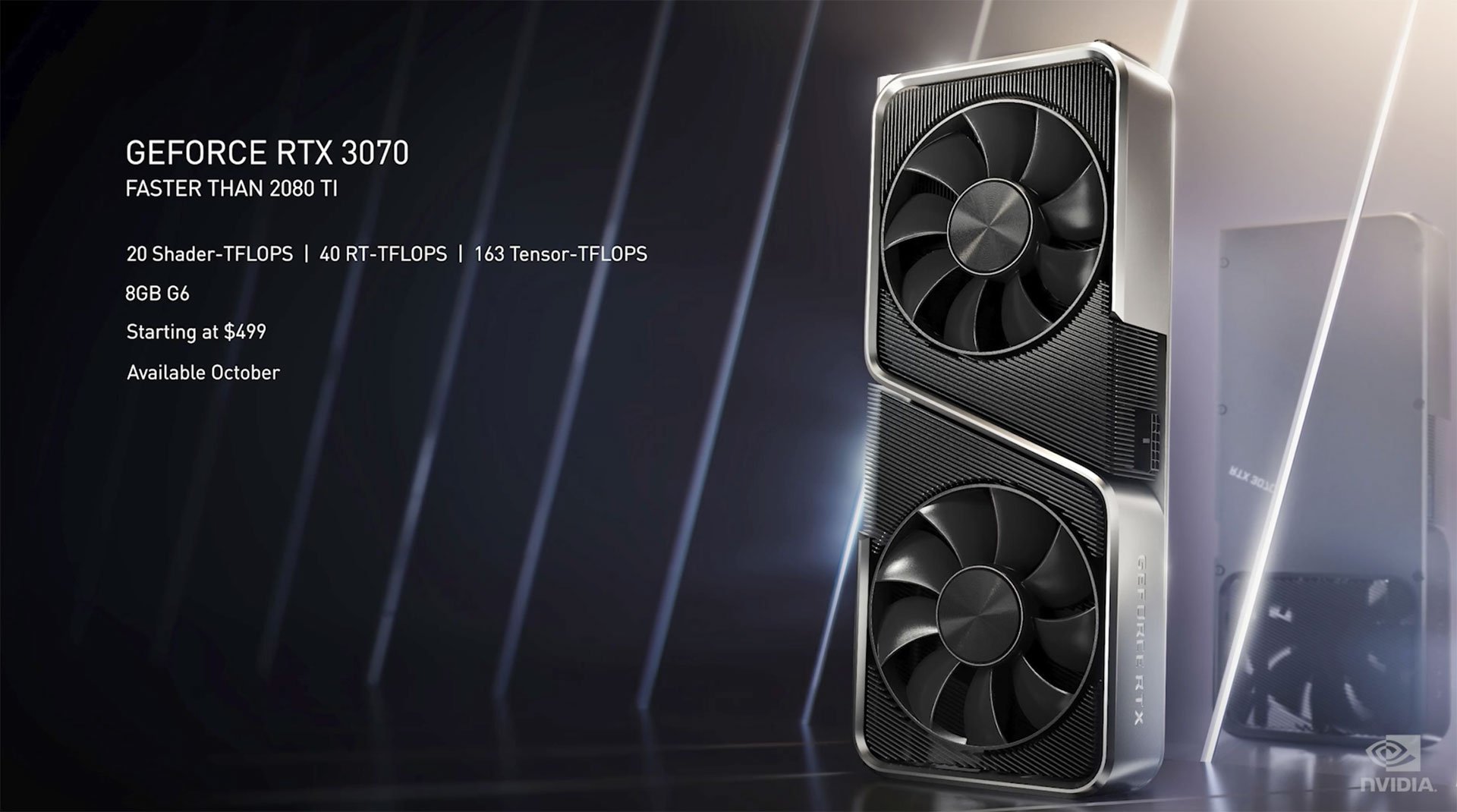RTX 3070 VS 3080: Which Is Better Value For Money?
The RTX 3070 benchmarks are now here, and as it turns out, they have pretty much confirmed a great deal of what I discussed in this article just a few days ago. If you've already read this post, and just want to see some of the supporting benchmarks, feel free to jump to the conclusion. And if you haven't read through this article yet, welcome! Please do have a read and you never know, you might just find some interesting thoughts and results...
Some thoughts on the RTX 3070 versus the RTX 3080: Price, 4K gaming performance, and availability...
NVIDIA's 30 Series Launch has been an interesting one to say the least, and with the RTX 3070 soon to arrive, we thought it would be even more interesting to discuss whether or not prospective buyers should be in the market for an RTX 3070 or an RTX 3080. As always, the answer isn't at first obvious, and depends on a few different things. Nevertheless, it's certainly an intriguing debate to be had, and there are many people on either side of the fence. So what exactly should we be considering, and what does this mean when it comes to deciding which way to go?
Well, a good place to start is the specs...
RTX 3070 Specs Vs RTX 3080 Specs
The easiest way to compare specs at a glance is with a good old chart or graph, which is exactly what you can see below. You'll notice that the 3080 is boasting a significant increase to CUDA Cores over the 3070, with 8704 versus 5888, and also offers more Tensor Cores, as well as Ray Tracing Cores with 272 and 68 respectively, over the 184 and 46 of the RTX 3070. Of course, the RTX 3070 does offer marginally higher clock speeds, but the RTX 3080 is also offering an additional 2GB of VRAM over the 8GB that the RTX 3070 has available, as well as being GDDR6X memory, offering improved bandwidth over that of its precursory GDDR6.
So, in a nutshell, and much to nobody's surprise, on paper the RTX 3080 is definitely a step up from the RTX 3070 - and by a significant margin too. We are yet to see benchmarks from the RTX 3070 though, so only time will tell how well it will perform in the real world, compared to the RTX 3080. But I think it's fairly safe to assume that the RTX 3080 will probably sit comfortably above the RTX 3070 with somewhere in the region of 20-30% more performance.
Naturally though, the question of which card is the best to go for isn't as clear cut as just, is the 3080 noticeably different? If it was, this would be an open-and-shut case. The real debate is in the value proposition of these two cards and what they offer, both compared to one another, and compared to the last generation of 20 series cards. In particular, when it comes to 4K capabilities.
Price & Performance, MSRP, and the RTX 20 Series
The most interesting element of this debate ultimately comes from the performance you get for every penny you pay. NVIDIA have highlighted on multiple slides and graphs that the RTX 3070 is capable of outperforming an RTX 2080Ti, which Videocardz calculated to represent around an 8% performance increase on average. This, of course, isn't actually all that impressive as far as card-on-card increases go, until you take into account the £469 MSRP of the RTX 3070. Compare that to the MSRP of an RTX 2080Ti, which was £1100 at launch, and that's one hell of a value proposition given the power previously on offer at that price point. The same point was pushed for the RTX 3080, which was said to offer around 2X the performance of an RTX 2080 and for £100 less, though as it turned out, this was a little way off from the real-world performance seen in gaming benchmarks (for more on this, check out our post on the actual performance of the RTX 3080).
Arguably though, even with "only" a 50-70% performance gain over the RTX 2080 for the RTX 3080, and the marginal uplift offered by the RTX 3070 over the RTX 2080Ti, if both were being sold at their MSRP of £469 and £649, then both would be offering pretty incredible performance for their pricing. For most gamers and enthusiasts, this has translated into an overwhelming excitement for the arrival of the RTX 3070, which most feel is the GPU of choice from the 30 Series for their gaming PCs, given that the 2080Ti was still capable of running 99% of titles, maxed out and still hitting steady framerates. Afterall, the RTX 3070 will essentially be an extremely cheap 2080Ti but with better Ray Tracing capabilities, something that most considered to be the main weakness of that card.
The key thing though, which is often overlooked by the more hyped among us, is that the value proposition we're discussing here hinges entirely on both real-world performance AND that the cards are in fact sold at NVIDIA's MSRP. So far for the RTX 3080, finding a model at NVIDIA's MSRP, besides the FE version, is like looking for Big Foot; they don't seem to exist. Many have speculated that this may be to do with the reference designs offered to AIBs by NVIDIA, whilst others have put this down largely to the impacts of COVID, or else low supply and high demand. Either way, currently the average price from some of the UK's largest PC hardware retailers appears to be somewhere around the £740-£780 mark for the "low" and "mid-range" variant cards, and the average lowest cost of an RTX 3080 floats somewhere in the region of £720, with the cheapest card I've seen coming in at £680. And that's all dependent on if they're even available...
It's no news to anyone that the RTX 30 series cards have been hard to come by at best, and at this point, stock availability at launch for new products in the tech world has become somewhat of a meme (which will almost certainly continue into next year). But sure enough, this has understandably been quite a gripe for some, which has left many who would have preferred a 3080 deciding they'd sooner have a 3070 in their PC than no card at all. Seeing as the card offers 2080Ti level performance and leaves them, in theory, with a fair few quid leftover in their wallets too, it's easy to understand the appeal.
What many might not realise though, is that, despite delays to the launch of the RTX 3070, which NVIDIA themselves have said is a tactic to ensure better availability on launch day, the reality is that the RTX 3070 will likely be just as hard to get your hands on as the RTX 3080. Granted, there will definitely be a fair few more than the RTX 3080s; given what I've seen and heard, I'd estimate around 10X more depending on the outlet (though bearing in mind just how few 3080s there were available at launch, that's still not a whole lot). This will by no means be enough stock for all of those looking to purchase a 3070. For me at least, this is reason enough for those originally considering a 3080 to maybe hold off, if they can, until at least the end of Q1 next year. By that time, availability should hopefully have started to normalise for both cards, opening up the opportunity to bag the better value GPU - in this case, that's the 3080, just to be clear.
"But wait; the 3080 will still be hundreds of pounds more expensive than the 3070. How is that better value?"
Well, for those with a sharper memory, a keener eye, or a calculator handy, you may have already noticed something awry with the numbers. And you'd be right.
Now, full disclosure, without knowing what price point the 3070 will actually be available at (though I have a pretty good idea), or knowing how it will perform in the real world, this is a more theoretical discussion based on what we know so far. Sadly, I am no prophet, so take what I say next with a pinch of salt. But this is how my thinking follows:
As of now, we know a few things for definite. Firstly, that the RTX 3080 has a significant and confirmed 50-70% performance increase over the RTX 2080, or a 30% average increase over the RTX 2080Ti. Meanwhile, the RTX 3070 has a yet to be confirmed 8% increase over the 2080Ti. With the RTX 3080 being originally cited as having 2X the performance of the RTX 2080, and ultimately falling short of that figure in reality, we can predict that there will also be a chance for the average performance of the 3070 to fall short of its quoted figures too. That could mean in reality, that the 3070 might only have, say, an average 5% performance gain over the 2080Ti in real-world benchmarks (or worse, barely any at all - though that really would be worst case scenario)...
Secondly, the 3080 is sporting an additional 2GB of superior GDDR6X memory, over the 3070's 8GB of GDDR6. Although both types of memory are extremely fast, and 8GB has historically been considered enough for gaming, these cards are being marketed, by and large, as 4K gaming GPUs. The 3080 has proven itself without much difficulty, and theoretically, the 3070 should be capable too (since the 2080Ti was). But that comes with a caveat. That being that the 3080 is arguably the first GPU to actually offer a consistent 60fps in a wide variety of games at 4K high-settings, whilst the 2080Ti could fluctuate at times, falling below that figure, sometimes as low as mid-40s. Throw in the likes of Unreal Engine 5 and more importantly, new consoles which are on the way, and the lowest common denominator of the gaming hardware world could start changing significantly, which in turn means that game development will start to evolve too - more so than in previous years. 8GB of GDDR6 on Ampere may be ample for 4K high-settings gaming now, but that could well change in the not so distant future, and I think those with 10GB of GDDR6X (meaning they'll benefit not just from more VRAM but more memory bandwidth too), will still be smiling for at least a little bit longer... how much though? Well, as I said, unfortunately I don't have a crystal ball.
We also know that the MSRP of these two cards were £469 and £649 respectively. Imagining for a moment that this had been the case, if you do the maths here, you'll notice that it's actually better value to opt for the 3080. Core per penny spent, the 3080 would actually work out at about 7.5p per core, whereas the 3070 would come in at 8p per core. This almost never happens with graphics cards, with higher-end cards normally offering increasingly worse value-for-money (*cough* RTX 3090 *cough*).
But in reality, the 3080 is more often sold in the region of £780-£800 for the higher-end models. That puts the 3080 at around £150 over its cited MSRP and skews that calculation, actually putting the card at 9p per core. However, it also only makes the 3080 around £50 over the MSRP of the 2080, of which we know the 3080 has a confirmed performance increase of up to 70%, and is still at least £200 cheaper than a 2080Ti at MSRP, with an average 30% performance gain.
Meanwhile, the 3070, in theory, will likely be retailed at somewhere between £560-£620 approximately, and this means two things: the increase will alter the pennies per core calculation again, this time increasing the cost to 10.5p per core for the 3070, which actually widens the value gap even further than if both cards were sold at their MSRP. It will also place the 3070 in the price bracket of some high-end variants of the RTX 2070 Supers, such as the Gigabyte Aorus 8GB, which was previously on the shelves for around the £600 mark. Given that the high-end variants of the 2070 Super were often capable of keeping pace with an RTX 2080 at those higher resolutions (both 1440p and 4K), and even 2080 Supers at times, well, the extra £200 for a 3080 is starting to look pretty tasty as far as value goes. And in particular, for those looking to upgrade from a 20 series card.
So, is the 3070 actually worth it? Or is it just 3080 all the way?
From where I stand, and with everything we know so far, using the launch of the RTX 3080 as a rough guide, with what we can potentially expect from the launch of the RTX 3070 I would argue that the 3080 is the all-round better decision for 4K gaming - if you can afford it, and if you can find one. It's giving us a lot more power over the older 20 series cards, has some select hardware advantages over the 3070 which could help it retain some of its value for longer, and is still selling from retailers for what is actually a pretty damn good price for the power you get out of it. With that said, although the value proposition of the RTX 3070 is not necessarily as good as the RTX 3080 when it comes to 4K gaming at maximum settings, that isn't to say it's a bad graphics card.
From what we've been led to believe so far, the RTX 3070 should shape up to be a solid "mid-ranger," and in the worst case scenario, will still offer an updated and slightly more powerful version of previous high-end 2070 Super cards - which were and still are really solid performers at 1440p, and even 4K for those who don't need a consistent 60fps across every single title. But what this potentially means for those in the market for a 1080p or 1440p card, capable of offering high-refresh gaming on maximum settings, is a GPU with insatiable value for money. As we mentioned before, this is essentially a 2080Ti at only a third of the cost. Which is insane, as I'm sure most can appreciate.
At the end of the day, it's all down to what your budget is. If the additional £200 is something you just can't quite stretch to, or wait for, then the 3070 will almost certainly still be a great choice for a new graphics card, and especially so for those still running on any of the 10 series cards from NVIDIA. Equally, if you're only looking to upgrade your system to have a little more generational performance, and without having to switch out PSUs or CPUs, the 3070 is definitely going to be your go-to. What's more, you'll also be more likely to get one around Xmas, rather than next year, which is more likely to be the case for the 3080...
I would also remind people that there are potentially other new GPU options on their way to the market. Big Navi will be arriving in November and looks to be shaping up nicely. The RTX 3060 is still due to arrive sometime down the line, and there were even rumours of Super/Ti variants of 30 series cards too.
Update 27/10/20 - The benchmarks
With benchmarks now available for all to see, I was pleasantly surprised to find that my predictions on performance weren't far off at all. Indeed, the RTX 3080 does appear to offer around 20-30% more performance over the RTX 3070 across the board, and across all three resolutions. It does, however, demonstrate the largest differences at 4K, offering up to 40% better framerates in some titles. If you'd like an overview of the results, as well as an insight into how these cards might perform in your existing set-ups, and not just in "best-case-scenario systems," I'd highly reccomend giving the video below by Hardware Canucks a watch.
Verdict
Even in the wake of the new benchmark results, my advice ultimately remains the same; in an ideal world, if you can wait until at least Q1 2021, maybe even Q2 at a push, you'll be in the best possible position to start thinking about which new graphics card will be perfect for you, be that an NVIDIA or AMD card. Why not check out our mini series, A Guide to Picking Custom PC Parts, in the meantime? In particular, part two has some more food for thought on what to look for from your next graphics card, and is a great piece for those looking to learn more about what graphics cards specs actually mean...
And with that, I open the floor to you - what do you guys think about the RTX 3070? Have I got it all twisted? Or do you think I've made some good points? Will you be after a 30 series card or waiting on AMD? Let us know your thoughts in the comments below.
Posted in TechShot
Published on 27 Oct 2020
Last updated on 09 Feb 2023
